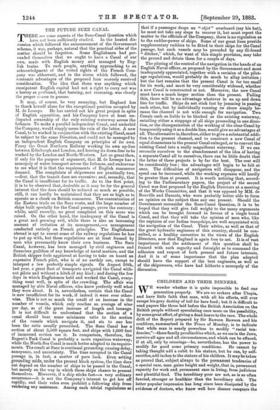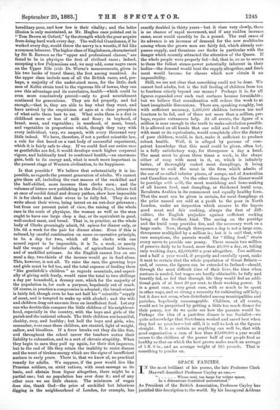CHILDREN AND THEIR DINNERS.
WE wonder whether it is quite impossible to feed one generation properly. We are no seekers after Utopia, and have little faith that man, with all his efforts, will ever escape his'grey destiny of toil for bare food; but it is difficult to read papers like those laid before the British Association on the British people without speculating once more on the possibility, by some great effort, of giving a dead-heave to the race. The whole drift of the Report prepared by Sir Rawson Rawson and his confrbres, summarised in the Times of Monday, is to indicate that while man is nearly powerless to modify " racial ten- dencies,"—those family peculiarities which, as we see in the Jews, survive all ages and all circumstances, and which can be effaced, if at all, only by crossings—be, nevertheless, has the power to modify for good some primary conditions. He cannot by taking thought add a cubit to his stature, but he can, by self- sacrifice, add inches to the stature of his children. It maybe taken as proved that, subject always to the permanent tendencies of a special race, man gains height and weight, that is, permanent capacity for work and permanent ease in living, from judicious and plentiful food. The hereditary poor are not, as is so often fancied, stronger or healthier than the hereditary rich. The latter popular impression has long since been dissipated by the evidence of doctors, who know well how disease conquers the hereditary poor, and how low is their vitality; and the latter illusion is only maintained, as Mr. Hughes once pointed out in " Tom Brown at Oxford," by the strength which the poor acquire from doing hard work every day. The well-fed Guardsman, if he worked every day, would throw the navvy in a wrestle, if fed like a common labourer. The higher class of Englishmen, characterised by Sir R. Rawson as the " upper and professional classes," are found to be in physique the first of civilised races; indeed, excepting a few Polynesians and, we may add, some negro races on the Upper Nile (vide Dr. Werne's measurements, given in his two books of travel there), the first among mankind. As the upper class include men of all the British races, and, per- haps, a majority of the under-sized races, for the little, dark men of Keltic strain tend to the vigorous life of towns, they can owe this advantage and its correlative, health—which could be even more conclusively proved—only to good nourishment continued for generations. They are fed properly, and fed enough,—that is, they are able to buy what they want, and have arrived by the empiricism of ages at a clear perception of what suits them best to eat. What snits them is a diet in childhood more or less of milk and flour ; in boyhood, of bread, meat, and vegetables ; in manhood, of meat, bread, and vegetables in proportions which, though they vary with every individual, vary, we suspect, with every thousand very little indeed. We have, therefore, if not a perfect scientific law, a rule for diet based on a vast body of successful experiment, which it is fairly safe to obey. If we could feed our entire.race as gentlefolks are fed, it would develops much higher corporeal vigour, and habitually tend to confirmed health,—an enormous gain, both to its energy and, what is much more important in the present stage of Western civilisation, to its happiness.
Is that possible P We believe that substantially it is im- possible, as regards the present generation of adults. We cannot give them all, including the vast masses of the unskilled and the half-skilled, more incomes than clerks earn ; and the volumes of letters now publishing in the Daily Yews, letters full at once of sordid detail and dreary pathos, show how impossible it is for clerks and their wives to be fully fed. They do not write about their wives, being intent on an out-door grievance; but from our present point of view, the raising of the whole race in the scale of physique, the woman as well as the man ought to have one large chop a day, or its equivalent in good, well-cooked meat, and bread. That is, in practice, as the whole body of Clerks groaningly admit, 9d. apiece for dinner only, or 10s. 6d. a week for the pair for dinner alone. Even if this is reduced, by careful combination on some co-operative principle, to ls. a day for two, which all the clerks with one accord report to be impossible, it is 7s. a week, or nearly half the wages of inferior clerks, of agricultural labourers, and of unskilled artisans. As the English cannot live on one meal a day, two-thirds of the income would go in food alone. This, however, is not all. To raise the race, the growing boys and girls must be fed too, and the total expense of feeding them "like gentlefolk's children" as regards essentials, and especi- ally of giving milk freely, would raise the total to two shillings a day per household, a dreamy sum, which for the majority of the population is, for such a purpose, hopelessly out of reach. Of course, in practice a compromise is adopted ; the bread-winner is fairly fed, though even he has not half his " scientific " supply of meat, and is tempted to make up with alcohol ; and the wife and children drag out anaemic lives on insufficient food. Let any one who doubts this compare the little children of his neighbour- hood, especially in the country, with the boys and girls of the parish and the national schools. The little children are beautiful, chubby, rosy, and healthy; but half the boys and girls, who, remember, were once these children, are stunted, light of weight, sallow, and bloodless. If a fever breaks out they die like flies, and throughout the school career the teachers notice their liability to exhaustion, and to a sort of chronic stupidity. When they begin to earn they pull up again, for their diet improves, but to the end of life they retain the inability to resist disease and the want of tireless energy which are the signs of insufficient nurture in early years. There is, that we know of, no practical remedy for adults. We suppose, if the poor would live like Prussian soldiers, on strict rations, with meat-sausage as its basis, and abstain from liquor altogether, there might be a partial one; but no population has ever done it; and of any other cure we see little chance. The minimum of wages does rise, thank God—the price of unskilled but laborious digging in the neighbourhood of London, for example, has exactly doubled in thirty years—but it rises very slowly, there is no chance of rapid movement, and if any sudden increase came, meat would speedily be 2a. a pound. The real cause of its advance is an increase of demand for the new multitudes among whom the grown men are fairly fed, which already sur- passes supply, and threatens our flocks in particular with the danger which recently attracted the attention of the Queen. If the whole people were properly fed—fed, that is, so as to secure to them the fullest steam-power potentially inherent in their bodies—the demand would beat the supply altogether, and fresh meat would become for classes which now obtain it an impossibility.
Still, we are not clear that something could not be done. We cannot feed adults, but is the full feeding of children from ten to fourteen utterly beyond our means P Perhaps it is, for all figures expanded over such vast surfaces become formidable ; but we believe that consideration will reduce the work to at least imaginable dimensions. There are, speaking roughly, but with sufficient accuracy, 2,400,000 children between ten and fourteen to be fed, and of these not more than a million, per- haps, require extraneous help. At all events, the figure of a million is near enough to the truth to make calculation possible. It is allowed on all bands that one solid and full meal a day, with meat or its equivalents, would completely alter the dietary of poor children, would, in fact, make it sufficient to produce robust health. Well, it is alleged by persons of com- petent knowledge that this meal could be given, often hot, in a fully satisfactory way, for threepence a day a head. The meat must be given three times a week, in the shape either of soup with meat in it, or, which is infinitely better, of thoroughly cooked meat dumplings, it being necessary to cook the meat in the form which admits of the use of so-called inferior pieces, of scraps, and of Australian and Canadian meat. On the other three days the dinner would be porridge with milk, the most nourishing and bone-making of all known food, suet dumpling, or thickened lentil soup, Revalenta Arabica in its commonest and equally healthy form. That the meat can be given is certain, for meat dumplings at the price named are sold at a profit to the poor in North London, under an inspection which secures to the buyers good meat and fair cooking, always the first of diffi- culties, the English prejudice against sufficient cooking being of the liveliest kind. The saving on the porridge and the lentil soup provides fire, and the necessary work on a large scale. Now, though threepence a day is not a large sum, threepence multiplied by a million is ; but it is said that, with
rare exceptions, the parents would, for " filling food," strain every nerve to provide one penny. There remain two million of pennies daily to be found, more than £8,300 a day, or, taking only working days, L2,600,000 a year altogether. Two millions and a half a year would, if properly and carefully spent, make
it next to certain that the whole population of Great Britain—
and, of course, the figures can be extended to Ireland—should, through the most difficult time of their lives, the time when nurture is needed, but wages are hardly obtainable, be fully and heartily fed, so fed that through life they would feel an addi- tional gain of at least 20 per cent. to their working power. It is a great sum, a very great sum, with so much to be spent in other ways, and so strong a necessity for cultivating self-help ; but it does not seem, when distributed among municipalities and parishes, hopelessly unmanageable. Children, at all events, would not be pauperised by getting a little too much dinner for their penny, nor do we quite see how the parents would be.
Perhaps the idea of a part-free dinner is too Socialist—we quite acknowledge that Scotchmen worked and saved best when they had no poor-law—but still, it is well to look at the figures
straight. It is as certain as anything can well be, that with
good organisation a sum of less than £3,000,000 a year would secure to the children of the poorer half of our people food as healthy as that on which the best grown males reach an average of 5 ft. 9 in., and an average weight of 185 pounds. That is something to ponder on.



































 Previous page
Previous page